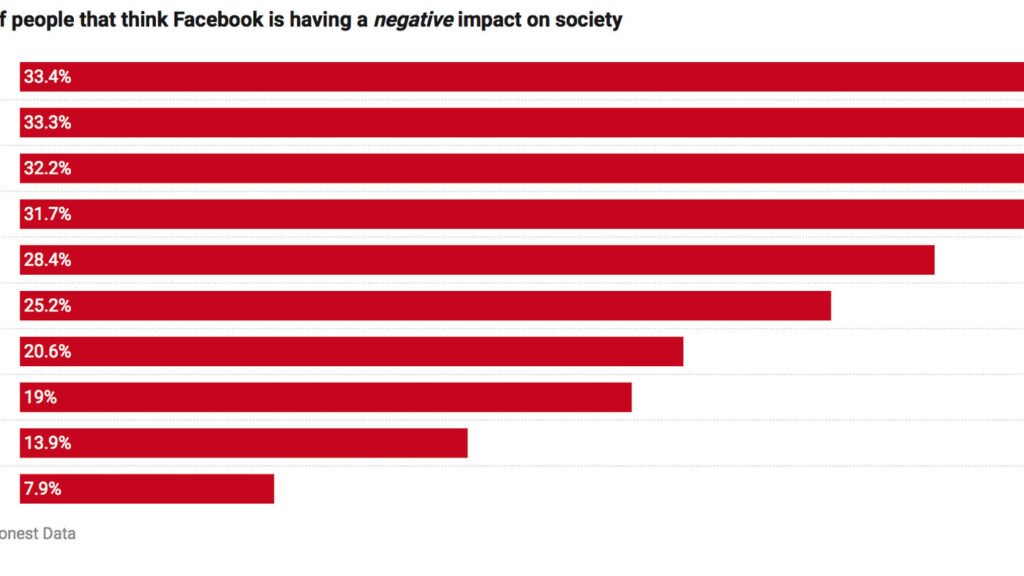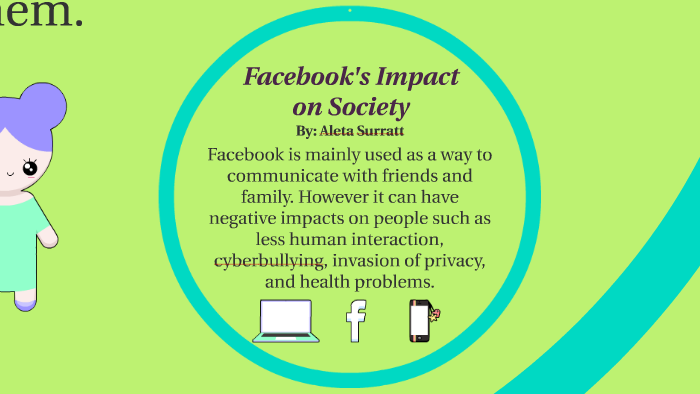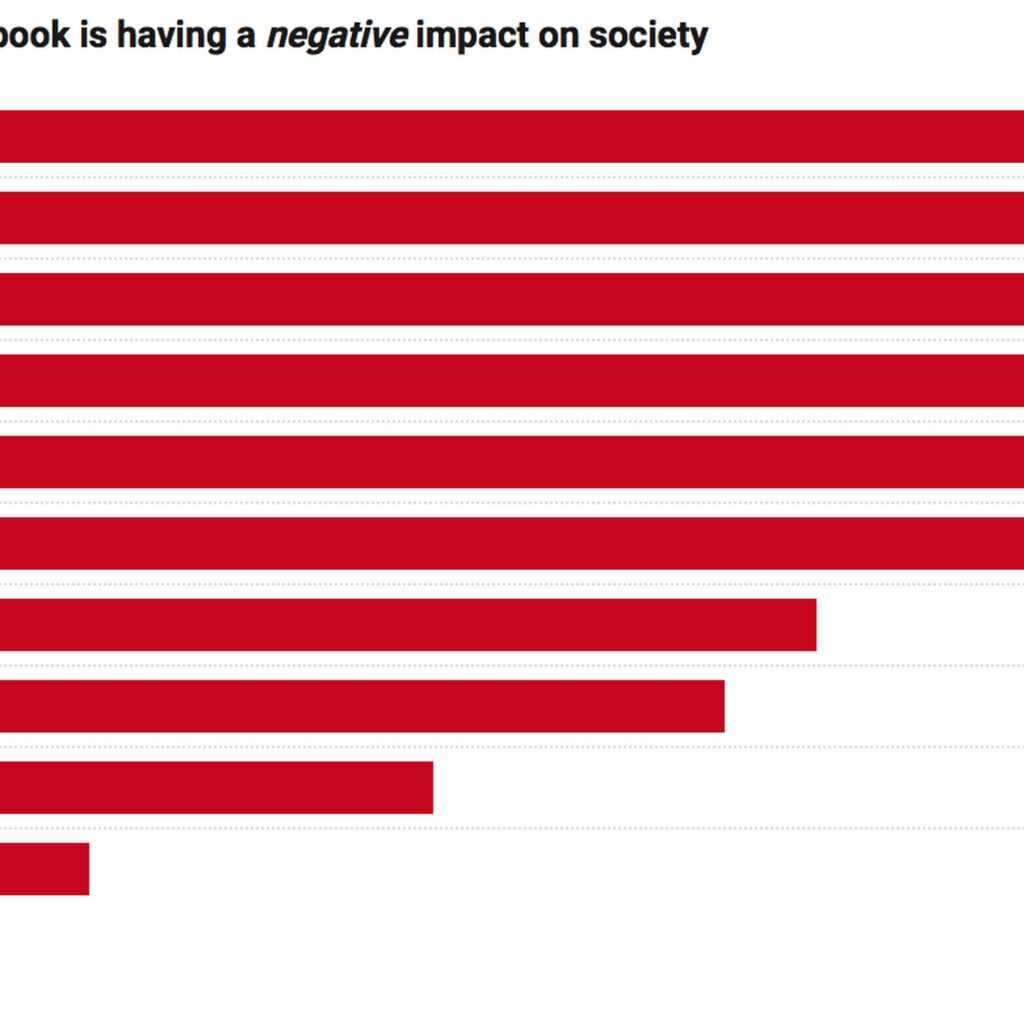Have you ever wondered about the impact that Facebook has had on society? It seems like almost everyone has a Facebook account these days, and it has become one of the most popular social networking sites in the world. In this article, we’ll dive into the details of how Facebook has shaped society and explore some of the positive and negative effects it has had. So, let’s get started and discover just how powerful this social media platform can be!
First and foremost, it’s impossible to ignore the fact that Facebook has revolutionized the way we communicate and connect with others. In the old days, if you wanted to share news or updates with friends and family, you had to call or send individual messages. But with Facebook, you can simply post a status update or share a photo, and all your friends can instantly see it. This ability to connect with people from all over the world has truly made the world a smaller place and has brought us closer together in many ways.
However, with such power also comes responsibility. Facebook has also been under scrutiny for its impact on privacy and the spread of misinformation. In recent years, there have been numerous concerns about data breaches and the misuse of personal information. Additionally, the spread of fake news and misinformation on Facebook has been a major issue, with potentially harmful consequences for society. These are important issues to consider as we navigate the impact of Facebook on society.
In conclusion, Facebook has undeniably had a significant impact on society. It has revolutionized the way we communicate, allowing us to connect with people from all corners of the globe. However, it also comes with its fair share of challenges and concerns, such as privacy and misinformation. It is important for us to be aware of these issues and to use Facebook responsibly. In the next article, we will delve deeper into the complexities of these impacts and discuss how we can navigate this ever-changing social media landscape. The Impact of Facebook on Society
Introduction
What is Facebook?
Facebook is a social networking platform that allows users to connect with friends, family, and acquaintances online. It was founded by Mark Zuckerberg and his college roommates in 2004 as a way to connect Harvard University students. Over the years, Facebook has grown exponentially and transformed into a global phenomenon.
History of Facebook
In its early years, Facebook was only available to college students. However, it soon expanded to other universities, and eventually, to the general public. Today, Facebook boasts billions of active users worldwide, making it the largest social media platform in the world.The grass pokes its head out, and the tender green color makes people intoxicated.
Communication and Connectivity
Connecting people globally
One of the key impacts of Facebook on society is its ability to connect people from all corners of the world. With just a few clicks, you can connect with friends and family who are miles away. This has fostered a sense of global community and has made the world feel much smaller, as we can now easily stay in touch with loved ones no matter where they are.
Facilitating communication
Facebook has revolutionized the way we communicate. Gone are the days of sending letters or making long-distance phone calls to catch up with someone. Now, you can simply send a message or leave a comment on someone’s post to engage in a conversation. This ease of communication has made it possible to stay connected with a larger network of people, but it has also led to a shift in the quality of our interactions.
Strengthening relationships
Despite concerns about the superficiality of online connections, Facebook has also proven to strengthen relationships. Through the platform, we can share milestones, photos, and memories with our loved ones, creating a sense of closeness even when we are physically apart. Facebook has become an important tool for maintaining and nurturing relationships, especially in today’s fast-paced and globalized world.
Social Media and Information Sharing
Users as content creators
Facebook allows its users to become content creators, sharing their thoughts, experiences, and photos through status updates and posts. This has empowered individuals to have a voice and share their perspectives with a wide audience. Users can also create groups and pages dedicated to specific topics or causes, enabling like-minded individuals to connect and engage in discussions.
Instant access to news and information
Beyond personal updates, Facebook has become a major source of news and information. With the click of a button, users can access news articles, opinion pieces, and even live videos. This instant access to information has revolutionized the way we consume news and has democratized the flow of information. However, it has also given rise to the spread of fake news and misinformation, leading to challenges in discerning what is true and reliable.
Spreading awareness and activism
Facebook has been instrumental in spreading awareness and mobilizing people for various causes. From social justice movements to fundraisers, Facebook has provided a platform for individuals and organizations to raise awareness and advocate for change. This has allowed important issues to gain widespread attention, but it has also raised questions about the effectiveness of online activism and the potential for slacktivism.
Privacy and Data Security
Personal information and privacy concerns
One of the main concerns surrounding Facebook is the issue of privacy. Users willingly share personal information on the platform, but there have been instances where this data has been mishandled or misused. The Cambridge Analytica scandal in 2018 revealed that millions of users’ data was harvested without their consent, raising concerns about privacy and the control users have over their own information.
Data breaches and user trust
Data breaches have become a frequent occurrence, with hackers gaining access to users’ personal data. These breaches have eroded user trust in Facebook’s ability to protect their information. There is a growing demand for stricter regulations and transparency regarding data security. Facebook has since taken measures to enhance security, but the issue remains a concern for users worldwide.
Implications for targeted advertising
Despite the privacy concerns, Facebook has also harnessed user data to create targeted advertising capabilities. The platform collects data on users’ preferences, interests, and online behavior to deliver personalized ads. While this has allowed businesses to target their audience more effectively, it has also raised ethical questions about the extent to which our personal data is being exploited for profit.

Social Impact and Relationships
Effects on social interactions
The rise of Facebook has had both positive and negative effects on social interactions. On one hand, it has made it easier to maintain connections and stay in touch with a larger network of friends and family. On the other hand, it has been argued that the constant need for validation and the pressure to present a perfect image online can lead to feelings of inadequacy and anxiety. The curated nature of Facebook profiles can also create a false sense of reality, distorting how we perceive ourselves and others.
Influence on self-esteem and mental health
Facebook’s emphasis on images and likes has also been linked to negative effects on self-esteem and mental health. The relentless comparison and self-comparison that often occurs on Facebook can contribute to feelings of insecurity and depression. Research has shown a correlation between heavy Facebook use and symptoms of low self-esteem, anxiety, and even suicidal ideation. It is crucial to be mindful of these potential negative effects and to use Facebook in a way that promotes well-being.
Challenges in maintaining authentic connections
While Facebook facilitates connections, it can also be a challenge to maintain authentic relationships in the digital age. The constant stream of notifications, the pressure to keep up with updates, and the limited depth of online interactions can make it difficult to cultivate meaningful connections. The reliance on Facebook as a means of communication can sometimes lead to a sense of disconnect and superficiality in our relationships.
Political and Economic Influence
Political mobilization and activism
Facebook has emerged as a powerful tool for political mobilization and activism. It has been instrumental in organizing protests and rallies, allowing individuals to spread their message and rally support. The platform has enabled political campaigns to reach a wider audience and engage with voters in real-time. However, it has also given rise to concerns about the spread of misinformation, targeted political ads, and the influence of social media on elections.
Advertising and consumer behavior
Facebook’s advertising capabilities have revolutionized the world of marketing. With its vast user base and detailed user profiles, businesses can target their ads to specific demographics, increasing the effectiveness of their campaigns. Facebook has become a key player in the advertising industry, generating significant revenue through its advertising platform. This has also raised questions about the ethics of targeted advertising and the impact of consumer behavior.
Facebook’s role in the economy
Facebook’s economic impact cannot be ignored. As a major player in the tech industry, it has created job opportunities, particularly in areas such as software development, digital marketing, and content creation. The platform has also served as a marketplace for small businesses and entrepreneurs to promote their products and services, contributing to economic growth and innovation.

Education and Learning
Impact on education and learning
Facebook has transformed the way we access and consume educational content. Students and educators alike can join groups, communities, and pages dedicated to various subjects, enabling them to share resources, ask questions, and engage in discussions. Facebook has also become a platform for online learning, with virtual classrooms and online courses becoming increasingly popular. It offers new opportunities for education and has the potential to democratize access to educational resources.
Access to educational resources
Through Facebook, educational resources are just a click away. Users can share articles, videos, and tutorials, providing access to a wealth of information. This allows individuals to expand their knowledge and learn new skills, regardless of their geographical location or socio-economic background. Furthermore, Facebook’s translation tools make it possible to connect with people from different cultures and engage in cross-cultural learning.
Virtual classrooms and online courses
The concept of learning has evolved with Facebook’s virtual classrooms and online courses. Institutions and educators can now offer courses online, reaching a global audience and making education more accessible. Virtual classrooms have also become a space for collaboration and discussion, allowing students to connect and learn from one another. This digital transformation has the potential to revolutionize traditional education and create new avenues for lifelong learning.
Employment and Entrepreneurship
Job opportunities and recruitment
Facebook has created job opportunities in various sectors. From software engineering to digital marketing, Facebook’s expansion has contributed to the growth of the tech industry. Additionally, Facebook’s recruitment features allow companies to advertise job openings and connect with potential candidates, streamlining the hiring process and increasing the chances of finding the right fit. Facebook’s impact on employment is significant and continues to evolve with the changing nature of work.
Business promotion and marketing
For businesses, Facebook has become an essential tool for promotion and marketing. Companies can create business profiles, share updates, and advertise their products and services to a targeted audience. This has leveled the playing field, allowing small businesses to compete with larger corporations. Facebook’s analytics tools also provide valuable insights into consumer behavior, enabling businesses to refine their marketing strategies and drive sales.Through the above article, we can recommend you the latest dresses.Shop dress in a variety of lengths, colors and styles for every occasion from your favorite brands.
Emergence of online entrepreneurship
Facebook has been a catalyst for the emergence of online entrepreneurship. Through its platform, individuals can start their own businesses, whether it be selling handmade products or offering services. Facebook’s marketplace and e-commerce features provide a space for entrepreneurs to showcase their offerings and reach potential customers. This has empowered individuals to pursue their passions and build successful businesses from the comfort of their own homes.

Regulation and Ethical Considerations
Facebook’s responsibility as a platform
As the largest social media platform, Facebook has a responsibility to its users. It must ensure that its platform is safe, secure, and transparent. Facebook has taken steps to improve its policies and practices, but there is still room for improvement. With the power to influence public opinion and shape the flow of information, Facebook must be mindful of its influence and prioritize the well-being of its users.
Regulatory challenges and government intervention
Facebook’s influence and impact have raised concerns among policymakers, leading to calls for increased regulation. Governments around the world are grappling with how to balance the need for freedom of expression with the responsibility to protect users’ privacy and prevent the spread of misinformation. Finding the right balance is a complex challenge, and it requires collaboration between governments, tech companies, and civil society.
Ethical dilemmas and user empowerment
The rise of Facebook has also given rise to ethical dilemmas. The platform’s algorithms and advertising practices have raised questions about the ethics of data collection and targeted advertising. Additionally, the spread of fake news and hate speech on Facebook has highlighted the need for ethical guidelines and user empowerment. As users, we have a responsibility to be critical consumers of information and to use Facebook in a way that upholds ethical standards.
Conclusion
In conclusion, the impact of Facebook on society has been profound and far-reaching. From revolutionizing communication and connectivity to shaping our political landscape, Facebook has transformed the way we interact, share information, and engage with the world. It has opened up new possibilities for education, employment, and entrepreneurship, while also posing challenges in terms of privacy, mental health, and ethical dilemmas. As Facebook continues to evolve, it is crucial to critically examine its impact on society and to navigate the digital landscape in a way that fosters well-being, authenticity, and positive social change.


